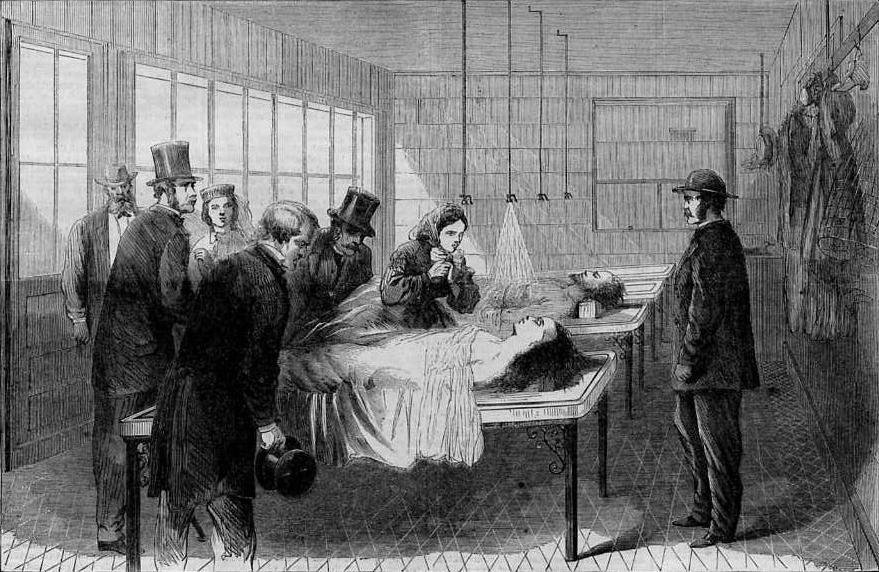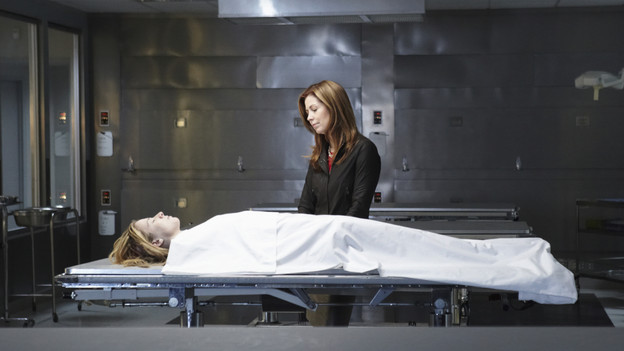
Once or twice a month, my alarm clock goes off at 7 am on the weekend, I pack a peanut butter and jelly sandwich and a thermos of coffee, and board the green line metro to the DC Consolidated Forensic Laboratory. I’m a grief counselor and I work part-time helping people identify their deceased loved ones at the DC Office of the Chief Medical Examiner.
Let me start out by saying that working at the medical examiner’s office does not at all resemble an episode of “CSI” or “Bones” lest imaginations start running wild. If reality was like CSI, I would have a much more expensive wardrobe and my lip gloss would always be perfectly applied. There’s no dramatic drawing back of a curtain or sheet to reveal the body in question while someone gasps “That’s him!” and faints to the ground. All identifications are done by a photograph and the person making the identification is usually 99% sure at that point that the decedent actually is their friend or relative.
The first step when working with an individual or family at the Medical Examiner’s office is to bring their anxiety level down as much as possible and bring support into the room. I introduce myself, explain who I am, and let them know I will be with them during the entire identification process. I express my genuine sympathies for their loss. I also let them know that the identification will be done by photo and that everything takes place in the room that we are currently sitting. Great detail about the process is given so that individuals know exactly what to expect. Fantasies are often worse than reality. After all, the person making the identification of the decedent has probably also watched crime dramas on television and could be envisioning the worst.

I take immense care to explain how the photo is viewed and what the photo will look like. I explain that the photo will be presented face down on a clip board and will be a picture of their loved one’s face surrounded by a blue sheet similar to those found in doctors’ offices. I make them aware of any potential marks that may have resulted from an accident or medical intervention. I let them know they can take as long as they need to turn the photo over on the clipboard and view the image. No matter what is going on outside the identification room, I convey that I have all the time in the world for this family.
The goal of my job is to help make the process of identifying the deceased as gentle as possible. Humans generally have an instinct to help when they see someone else hurting. I am no exception. But for the individuals that come to make an identification at the Medical Examiner’s office, I have to accept that I can’t take away their pain in our one brief encounter.
What I can do in my role as a grief counselor is prevent people from becoming re-traumatized during the identification process. Often individuals I encounter at the morgue have experienced some type of trauma resulting from facing a sudden or unexpected death. Trauma is defined as an incident involving actual, or the threat of, death or serious injury and involves feelings of shock, horror, and fear. And for many making an identification of a loved one at the DC Medical Examiner’s Office, this experience is just one in a long line of traumas.

Once the identification is made, I talk with the individuals about resources that might help them and connect them to various social service agencies if needed. I let people know about where they can get long-term support and mental health counseling. Sometimes people need help and coaching on how to talk to children about death. Other times I answer questions ranging from autopsies to how the Medical Examiner’s office interacts with funeral homes. I do my best to make sure that individuals are collected enough after the identification to go back into the world and take whatever their next steps happen to be.
Last week a gentleman who came to identify his mother said that he felt bad that I had to do this kind of work. My first initial reaction was to feel surprised. My corresponding thought was there is no reason why he should feel sorry for me. Doing this type of work is an honor and a privilege. I simply explained to the man that I believe that death is as natural as birth. Some people are there at the beginning of someone’s life and other people are there at the end. At times I feel woefully inadequate in the presence of such extreme loss, but I do my best to be what my mentor, Stephanie Handel, at the Wendt Center for Loss and Healing, has taught me about being an “exquisite witness” to an individual’s grief. At the very least, that person knows I believe their loss is important and has been provided with the resources to obtain additional support in the future.
I feel lucky to be able to experience death in such a direct way. Facing my mortality on a daily basis has a lot of benefits in addition to reminding me to eat my vegetables, say no to drugs, wear safety gear, and avoid befriending people with both anger issues and firearms. I keep things in perspective since few challenges measure up to crisis level after an afternoon at the medical examiner’s office. I have increased gratitude for the people and things in my life that make me feel cared for, safe, and loved.
Becoming a grief counselor and working at the morgue is not the only way to obtain a greater sense of one’s own mortality, although I certainly have a passion for my work. Volunteering for a hospice organization, hospital, nursing home, homeless shelter or food bank, or a children’s grief and loss camp can all be excellent opportunities to help others and engage in self-reflection. Connecting with others and hearing peoples’ stories of loss, and how they make meaning out of that loss, is a necessary reminder of what it truly takes to live.
Liz Kelly, MSW, LGSW is a mental health professional and social worker. She founded the website, www.politicope.com, a mental wellness resource for those living and working in the Washington, DC. She can be reached at politicope@gmail.com.
